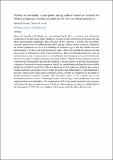| dc.description.abstract | Given the benefits of biofuels over conventional fuels, there is concern that widespread production of biofuels from edible feedstocks to meet demand will lead to food insecurity and other socioeconomic challenges. Thus, the goal of this research is to look into the techno-economic potential of non-edible oilseed plants and agricultural wastes as primary feedstocks for biofuel production in Africa. The inability of biofuel to cope in the fuel market has been demonstrated to be due to the high production costs, which limit profitability because the end price is heavily influenced by that of conventional fuel. However, the high production costs are entirely due not only to components such as feedstock, conversion processes, and infrastructure but also to a lack of techno-economic assessment (TEA). African biofuel production can be competitively industrialized through the adoption of strong supportive policies and programs. Adoption of these policies and programs is critical for capitalizing on the benefits of non-edible feedstocks in biofuel production while also boosting rural development through job creation. Techno-economic assessment of conversion processes and infrastructure is recommended to provide a clear picture of the techno-economic aspects, serving as a blueprint for the design of biofuel production facilities. Further, TEA has been shown to be a useful tool in the development process of new technologies aimed at lowering overall production costs and making biofuel more affordable. The combination of TEA and enabling policies and programs will increase the price competitiveness of biofuels, allowing them to capture a sizable share of the fuel market. © 2023 Society of Industrial Chemistry and John Wiley & Sons Ltd. | en_US |

